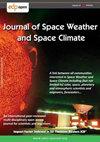Multi-instrument detection in Europe of ionospheric disturbances caused by the 15 January 2022 eruption of the Hunga volcano
IF 2.7
2区 物理与天体物理
Q2 ASTRONOMY & ASTROPHYSICS
引用次数: 9
Abstract
The 15 January 2022 eruption of the Hunga volcano provides a unique opportunity to study the reaction of the ionosphere to large explosive events. In particular, this event allows us to study the global propagation of travelling ionospheric disturbances using various instruments. We focus on the detection of the ionospheric disturbances caused by this eruption over Europe, where dense networks of both ionosondes and GNSS receivers are available. This event took place on the day of a geomagnetic storm. We show how data from different instruments and from different observatories can be combined to clearly distinguish the TIDs produced by the eruption from those caused by concurrent geomagnetic activity. The Lamb wave front was detected as the strongest disturbance in the ionosphere, travelling at between 300 and 340 m/s, consistent with the disturbances in the lower atmosphere. By comparing observations obtained from multiple types of instruments, we also show that TIDs produced by various mechanisms are present simultaneously, with different types of waves affecting different physical quantities. This illustrates the importance of analysing data from multiple independent instruments in order to obtain a full picture of an event like this one, as relying on only a single data source might result in some effects going unobserved.2022年1月15日亨加火山喷发引起的欧洲电离层扰动的多仪器探测
2022年1月15日洪加火山爆发为研究电离层对大型爆炸事件的反应提供了一个独特的机会。特别是,这一事件使我们能够使用各种仪器研究旅行电离层扰动的全球传播。我们的重点是探测这次喷发在欧洲造成的电离层扰动,欧洲有密集的电离层探测器和全球导航卫星系统接收器网络。这件事发生在地磁风暴的那天。我们展示了如何将来自不同仪器和不同天文台的数据结合起来,以清楚地区分火山喷发产生的TID和同时发生的地磁活动引起的TID。兰姆波前被探测为电离层中最强的扰动,传播速度在300至340米/秒之间,与低层大气中的扰动一致。通过比较从多种类型的仪器获得的观测结果,我们还表明,由各种机制产生的TID同时存在,不同类型的波影响不同的物理量。这说明了分析来自多个独立仪器的数据以获得像这次事件的全貌的重要性,因为仅仅依赖一个数据源可能会导致一些影响无法观察到。
本文章由计算机程序翻译,如有差异,请以英文原文为准。
求助全文
约1分钟内获得全文
求助全文
来源期刊

Journal of Space Weather and Space Climate
ASTRONOMY & ASTROPHYSICS-GEOCHEMISTRY & GEOPHYSICS
CiteScore
6.90
自引率
6.10%
发文量
40
审稿时长
8 weeks
期刊介绍:
The Journal of Space Weather and Space Climate (SWSC) is an international multi-disciplinary and interdisciplinary peer-reviewed open access journal which publishes papers on all aspects of space weather and space climate from a broad range of scientific and technical fields including solar physics, space plasma physics, aeronomy, planetology, radio science, geophysics, biology, medicine, astronautics, aeronautics, electrical engineering, meteorology, climatology, mathematics, economy, informatics.
 求助内容:
求助内容: 应助结果提醒方式:
应助结果提醒方式:


